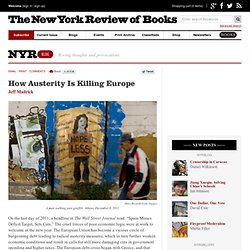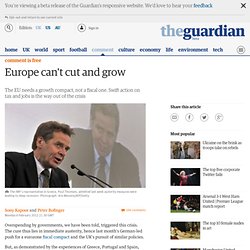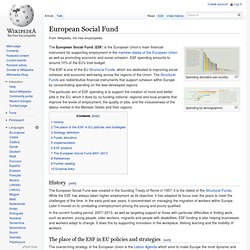

Europe 2020 – Europe's growth strategy. European Employment Strategy. Europe2020 Competitiveness Report. What's wrong with EU2020? Why is the EU important for anti-poverty? Employment & Poverty - EAPN. EAPN Ireland actively promotes the idea that everyone of working age should have access to a quality job.

We are also concern ourselves at a policy level with (1) unemployment in a comparative European context, (2) comparative European responses to unemployment and the welfare state and (3) the strong and deeply damaging link between poverty and unemployment. EAPN Ireland convenes an Employment Working Group of mainly national community organisations which engages with a number of areas related to employment policy at national and European level.
This section of the site is under under development to take into account a constantly evolving employment context at national and European level. Each section below includes an ‘explainer’ and further reading. Contents: Employment Policy 1. There is a well documented correlation between poverty and unemployment. Back to contents 2. ‘Activation’ is the term applied broadly to ‘welfare to work’ policy. Economy needs human rights. GENEVA (5 October 2012) – A group of United Nations independent experts on extreme poverty, external debt and equitable order reminded European Union governments that economic reforms must be crafted in line with the human rights obligations of States, following the release of a European-wide flagship study on the structure of the EU banking sector.

Responding to the ‘Liikanen report’, which recommends a set of regulatory measures to shield taxpayers from future bailouts and avoid shocks to the financial system, the human rights experts urged EU authorities to ensure that vital public funds are not used on collapsing financial firms in the future. Irish Government not reaching its own targets on Europe 2020 Strategy - failing poor and vulnerable. Are Europe's leaders giving up on Europe's poor? Judging by their actions in recent days European leaders seem to be abandoning the most vulnerable people in Europe.

At its meeting on March 25/6, 2010 the European Council failed to set targets on reducing poverty or addressing educational disadvantage. While the European Commission had proposed relatively modest targets on both issues to be two of the five headline goals for the Europe 2020 Strategy, these were not accepted by the Heads of Government. Instead they produced meaningless, aspirations in their ‘Conclusions’ published on March 26.
The Euro Crisis. Responses to EU crisis 2012. Austerity has never worked. Last week saw a string of bad economic news reports.

The eurozone leaders seem unwilling or unable to change from their austerity policies, even as Greece and Spain fall apart and the core eurozone economies contract. Britain watches on as its economy is heading for the third consecutive quarter of contraction, with an unexpectedly sharp fall in manufacturing. Last week's jobs figures confirmed that the US recovery is stuttering. The largest developing economies that have so far provided some support for world demand levels – especially India and Brazil but even China – are slowing down too.
Four years after the financial crisis began, many rich capitalist economies have not recovered their pre-crisis output levels. IMF: We got effect of austerity wrong. How Austerity Is Killing Europe by Jeff Madrick. On the last day of 2011, a headline in The Wall Street Journal read: “Spain Misses Deficit Target, Sets Cuts.”

The cruel forces of poor economic logic were at work to welcome in the new year. The European Union has become a vicious circle of burgeoning debt leading to radical austerity measures, which in turn further weaken economic conditions and result in calls for still more damaging cuts in government spending and higher taxes. The Crisis of European Democracy. The Myth of Europe - by Gareth Harding. When the euro officially entered circulation at the stroke of midnight on Jan. 1, 2002, fireworks lit up the night sky across Europe to celebrate the scrapping of the French franc, German deutsche mark, Greek drachma, and a clutch of other ancient currencies.

Brussels hosted an extravagant sound-and-light show, while Frankfurt unveiled a five-story statue of the freshly minted euro as a pop band belted out "With Open Arms (Euro World Song). " Sony Kapoor and Peter Bofinger. Overspending by governments, we have been told, triggered this crisis.

The cure thus lies in immediate austerity, hence last month's German-led push for a eurozone fiscal compact and the UK's pursuit of similar policies. But, as demonstrated by the experiences of Greece, Portugal and Spain, this course leads to biting, deep recessions and worsens public indebtedness. European Social Fund. European Social Fund. Spending allocation per country.

Spending by demographics. European Social Fund. Minister Social Protection outlines priorities for upcoming EU Presidency - Public Affairs Ireland. The Minister for Social Protection, Joan Burton TD, this week outlined her priorities for the upcoming EU Presidency before the Joint Committee on Education and Social Protection.

The Minister stated that an informal Ministerial Meeting of Ministers of Employment and Social Affairs would take place in Dublin, in February 2013. The theme of this meeting will be “Supporting People into Employment “and will focus mainly on the issue of youth unemployment. The meeting will be particularly timely as it will take place just two months after the EU Commission publish the Youth Transition Package in December 2012. Following publication of this package, the proposed “youth guarantee” is likely to be top of the agenda. The “Youth Guarantee” aims to help reduce youth unemployment across Europe and, if implemented, would guarantee that a young person receives a job offer, an apprenticeship, training or combined work and training, within four months of becoming unemployed.